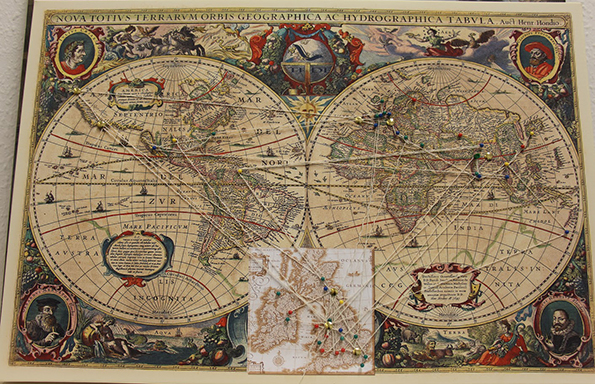A €2million research project investigating how mobility in the “great age of travel” – between 1550-1700 – shaped English perceptions of identity, has launched.
The five year Travel, Transculturality and Identity in England (TIDE) study will examine how human identity was influenced by the cross cultural encounters of the era, with the aim of generating new understanding of the key terms, concepts and debates.
Its team of international scholars will track these themes across fields such as trade and diplomacy, law, religion and ethnography, and literature. The information uncovered will then be used by writers to generate new work considering contemporary encounters with the same issues.
Funded through the European Research Council (ERC), the project is led by Professor Nandini Das, in the University’s Department of English. The new writing strand will be supported by the Department’s Centre for New and International Writing (CNIW).
Prof Das said: “Asking the questions about mobility, belonging, and identity that TIDE raises is particularly important in the current climate, when the same issues are raging in Britain, and around the world.
“We hope that over the next five years, the research and public engagement we undertake through TIDE will act as a hub and a catalyst for conversations and new research, both within the University and beyond.”
The project was launched at a special event held in the School of the Arts Library, featuring a performance by actors who work regularly with Liverpool’s Everyman Theatre.
Hong Kong born British poet, academic and editor, Sarah Howe, recipient of the 2015 T.S. Eliot prize, read some of her work, alongside fellow award-winning poet, Vahni Capildeo. Currently Leverhulme Fellow in English at University College London, Sarah Howe will be TIDE visiting writer in 2018.
For 2017, the visiting writer is poet, novelist, essayist and playwright, Fred D’Aguiar. Born in London in 1960 to Guyanese parents, Fred is Professor of English at the University of California, Los Angeles.
TIDE visiting writers will attend meetings, have access to project materials, respond to research and produce new writing.
The project will also pursue an ambitious pubic engagement strategy, working with local and national institutions, archival collections and groups, it will operate in the three key areas of education and policy, literature and culture and community and society.
To find out more, please visit www.tideproject.uk
You can also follow TIDE on twitter @ERC_TIDE or visit the Facebook page at www.facebook.com/TIDEPROJECTUK
Save
Save
Save
